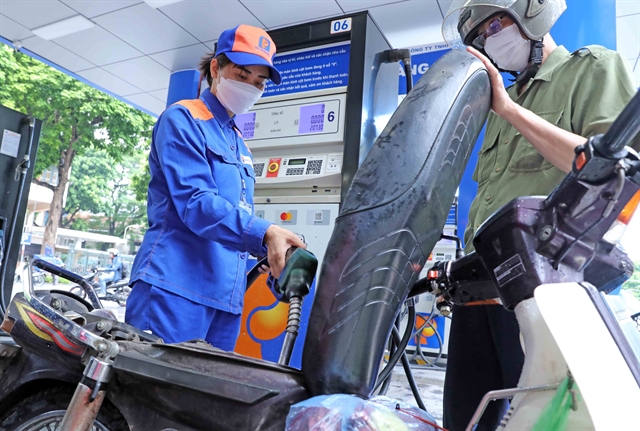 Economy
Economy

 |
| A motorcyclist gets his bike refilled at a gas station in Hà Nội. VNA/VNS Photo Trần Việt |
HÀ NỘI — The Ministry of Industry and Trade has acted quickly to keep fuel prices in check amid the unfavourable situation, said Minister Nguyễn Hồng Diên.
The minister was speaking at a hearing before the Economic Committee of the National Assembly on Tuesday about the fuel price situation.
Diên said some fuel sellers had deliberately tightened their supply to manipulate fuel prices and trigger fuel shortages since early 2022.
In the face of such illegal practices, the ministry has sent out three teams to inspect 33 fuel suppliers and taken measures to stabilise the market.
The team also inspected 2,700 fuel retailers nationwide between 2022 and 2023. They detected and fined over 600 violating fuel trading regulations, adding around VNĐ20 billion to the State budget.
He also said his ministry had made some revisions to Decree No.95 and No.83 on petrol trading and reported to the Government on the revisions.
The revisions would centre around the price adjustment periods, the rights and responsibilities of fuel traders, the price-setting process, the price-stabilising funds, and the minimum discount for retailers.
He also said the national fuel reserve would be adjusted from 9 days to 15 days between 2023 and 2025, and to 30 days from 2026 to 2030. Under his estimation, the State budget would need at least VNĐ4.1 trillion annually to pull off the adjustments, yet the target is currently beyond its means.
Meanwhile, speaking to the media ahead of the hearing, Giang Chấn Tây, director of the Bội Ngọc One-member Company Ltd, said that the market is showing cracks as fuel retailers are being treated unfairly.
He said the retailers have been stripped of the entitlement to discounts as they are at the bottom of the supply chain. As such, they have been left with no choice but to buy fuel from suppliers without a discount, resulting in unprofitability.
The director called for a revision to the decrees to plug the cracks. He said the revision should specify a reasonable profit margin for fuel retailers to ensure equal treatment across the supply chain.
Hà Thanh Tùng, a representative from the Hà Giang Petroleum Transport Trading Company Ltd, shared Tây's view, saying that at times over 9,000 fuel retailers had to sustain an aggregate monthly loss of VNĐ900 billion (US$38 million) due to the no-discount practice.
Another representative from the Phương Nam Petroleum Trading Investment JSC remarked that the lack of discounts has driven fuel retailers to unprofitability for quite a while.
To lift the retailers out of financial hardship, he suggested lawmakers revise the decrees so that profits would be distributed among suppliers, traders, and retailers in a prefixed proportion.
"Lawmakers should consider slicing the pie of profits among suppliers, traders, and retailers in a prefixed proportion to prevent fuel supply disruption," said the representative.
Nguyễn Thường Lạng, a lecturer at the National Economics University, believed that a minimum discount should be put in place to keep fuel retailers afloat and add more transparency to fuel price management.
Nguyễn Thị Sinh, director of the Chiến Thắng Petroleum Company LTD, was concerned that fuel retailers are finding themselves stuck between a rock and a hard place. They have to buy fuel without a discount and suffer a loss, or refuse to buy it and get a fine.
"It is not fair to fine retailers when they are financially unable to buy fuel," said Sinh.
The Ministry of Planning and Investment earlier revealed that fuel retailers were calling for a minimum discount of between 5 to 6 per cent to turn their financial situation around. But the ministry was against the request, saying that a minimum discount would disrupt market self-regulation. The ministry insisted on a market being free from such state interference. — VNS




